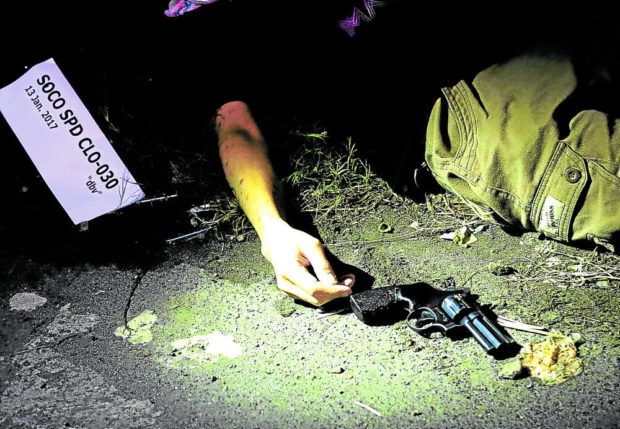Fortun: Autopsy of drug war victims uncovers falsified info

WAR ON DRUGS | The body of a suspected drug pusher lies on a street in Pasay City after he was killed during a buy bust operation. —(FILE PHOTO)
MANILA, Philippines — One of the country’s leading forensic pathologists on Tuesday said she had examined the remains of 46 people killed in President Rodrigo Duterte’s brutal war on drugs and found that the cause of death of some had been falsified and that the antinarcotics campaign targeted “the poorest of the poor.”
Dr. Raquel Fortun said she autopsied the drug war victims who died from June 15, 2016, before Duterte assumed office, to Aug. 13, 2017, with help from Fr. Flavie Villanueva’s Project Arise in exhuming the bodies from July 8, 2021, to Feb. 28 this year.
The youngest victim was 17 and the oldest was 55. Two were females.
The Philippine Drug Enforcement Agency (PDEA) reported in February that 6,225 drug suspects had been killed as of end-2021.
Some human rights groups say the real number may be between 12,000 and 30,000.
Article continues after this advertisement‘How can that be?’
Fortun said seven of the 46 she had autopsied had been reported to have died of “natural causes,” including, among others, sepsis, acute myocardial infarction (heart attack), pneumonia, hypertension and stroke. But one who supposedly died of a heart attack had multiple gunshot wounds.
Article continues after this advertisement“This is the case where he was violently killed and yet the doctor wrote a natural cause,” Fortun told reporters.
“So, how can that be? You have doctors staking their reputations, their names, their licenses, falsifying death certificates,” she pointed out. “There’s a law against this.”
There were 28 who had gunshot wounds while the cause of death of 11 others was either blank, incomplete, or “unknown.”
Doctors from the Philippine National Police autopsied 23 of the victims and three by National Bureau of Investigation doctors. Ten did not undergo any autopsy at all.
Another irregularity in the death certificates was that the cause of death was handwritten, instead of being typewritten, Fortun said.
She said 32 of the 46 had gunshot wounds, and 24 of them were in the head region. Three of the 24 also suffered blunt trauma to the head.
‘Intent to kill’
The Commission on Human Rights (CHR) had also looked into the killings and violence during the drug war from 2016 until February 2020 and found that dozens of victims were shot in the head, chest and abdomen, suggesting “an intent to kill.”
The CHR released in November last year the findings of its earlier analysis of drug-related killings. Its report covered 579 incidents in Metro Manila, Central and Southern Luzon.
According to the CHR, at least 87 victims sustained multiple gunshot wounds on different parts of the body, usually the head, chest, trunk and abdomen. Blunt force and injury and lacerations were also found on some of the victims, it said.
Fortun found that 17 of the 46 were jobless. No occupation was indicated for eight. Four worked in construction, two were scavengers, and the others included a painter, housewife, driver, pedicab driver, electrician, vendor, welder, fireman and a fishport worker. There was no death certificate for one of the victims.
Teeth tell much
Most of the teeth samples from the victims were in an “awful” state, she said, speculating that they had not seen a dentist in their entire life.
“What is this telling us? Targets are the poorest of the poor,” she said.
“We are simply after the truth, we are not taking sides here, that’s what we are doing. I do feel for the dead. When I examine the dead, they are humans, they were loved,” Fortun said.
She said the presentation of her findings at this time had nothing to do with politics or the May 9 presidential election.
“Basically, my point here is I want to help the families,” she said. “Whoever feels attacked by this, then sorry for that but that’s what forensic science is all about.”
“These individuals were finally given decent forensic investigation, something they were denied,” she added.
Villanueva said that even during the election season, it was still important to monitor the nearly six-year-old drug war.
“We need to follow this, put an end to this,” he said. “We will continue our stand for justice, our journey with the widows, so long as we get the justice that they deserve.”
His Project Arise aims to help rehabilitate drug addicts and assist their families. With their relatives’ permission, he also arranges the exhumation of drug war victims and the cremation of their remains.
—WITH A REPORT FROM INQUIRER RESEARCH
RELATED STORIES
PH drug war, rights situation back under global scrutiny
Total drug war deaths at 6,235 as of February 2022, says PDEA